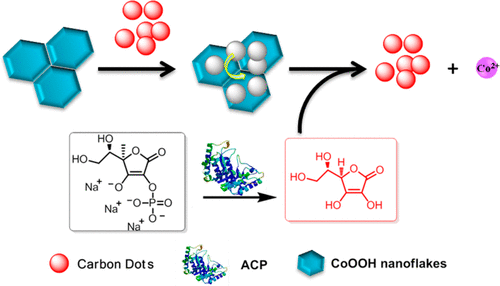Abstract
Because abnormal acid phosphatase (ACP) can disrupt the normal physiological processes, determination of ACP level is extremely important for early diagnosis, treatment, and prognostic evaluation of diseases. Herein, a fluorescence platform for monitoring ACP level was established based on the assembly of redemitting carbon dots (RCDs) on cobalt oxyhydroxide (CoOOH) nanoflakes. RCDs displayed excellent water solubility, pH stability, salt resistance, and photobleaching resistance. Interestingly, the fluorescence of the RCDs assembled on the surface of the CoOOH nanoflakes could be quenched due to the energy transfer caused by the nanoflakes. However, the ascorbic acid (AA) produced by the hydrolysis of ascorbic acid-2-phosphate trisodium salt (AAP) catalyzed by ACP could quickly and effectively reduce CoOOH nanoflakes, leading to the fluorescence recovery of the RCDs. Therefore, an "off-on" biosensor platform for rapid, sensitive, and selective detection of ACP was constructed with a limit of detection of 0.25 mU/L. With the assistance of the biosensor, the level of ACP in human serum samples was evaluated, and the spike recovery values ranged from 94.0% to 104.5%.

Keywords Plus:FLUORESCENCE TURN-OFFASCORBIC-ACIDSENSITIVITY DETECTIONALKALINE-PHOSPHATASEDOTSNANOSENSORBIOMARKERSNANOPROBEFE3+NANOPARTICLES
Published in LANGMUIR,Volume 37;10.1021/acs.langmuir.1c01512,SEP 7 2021


